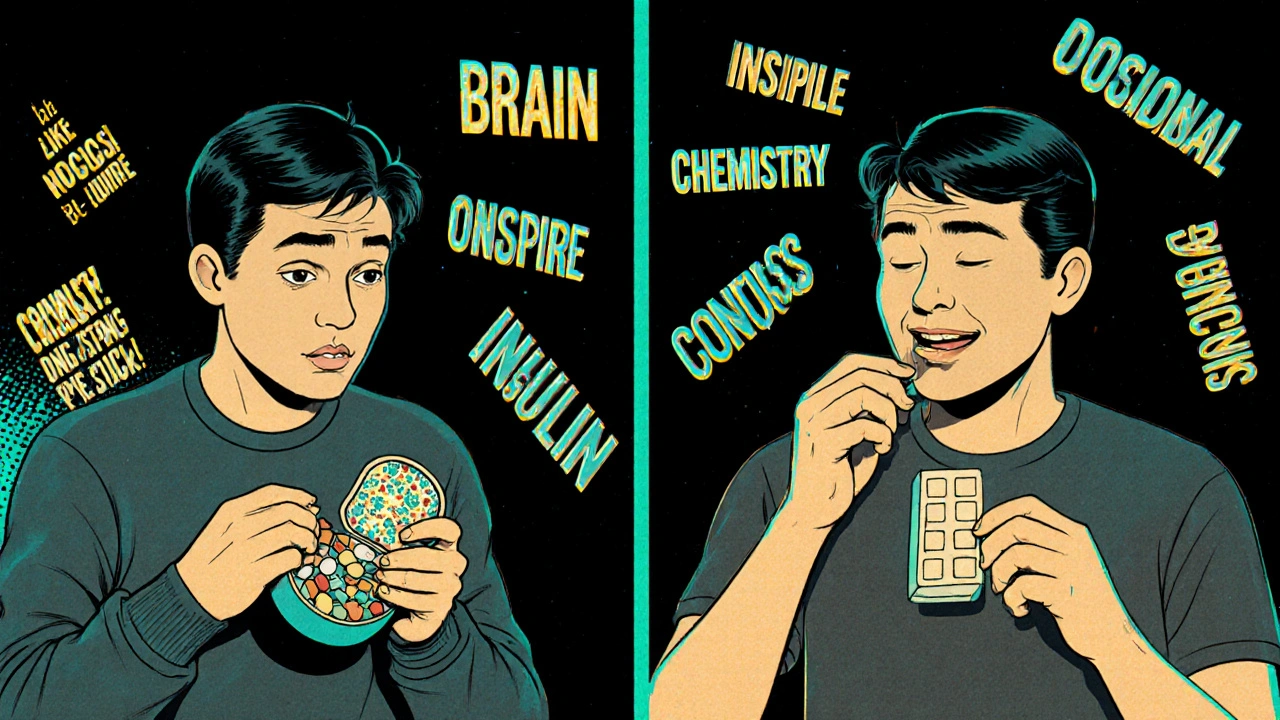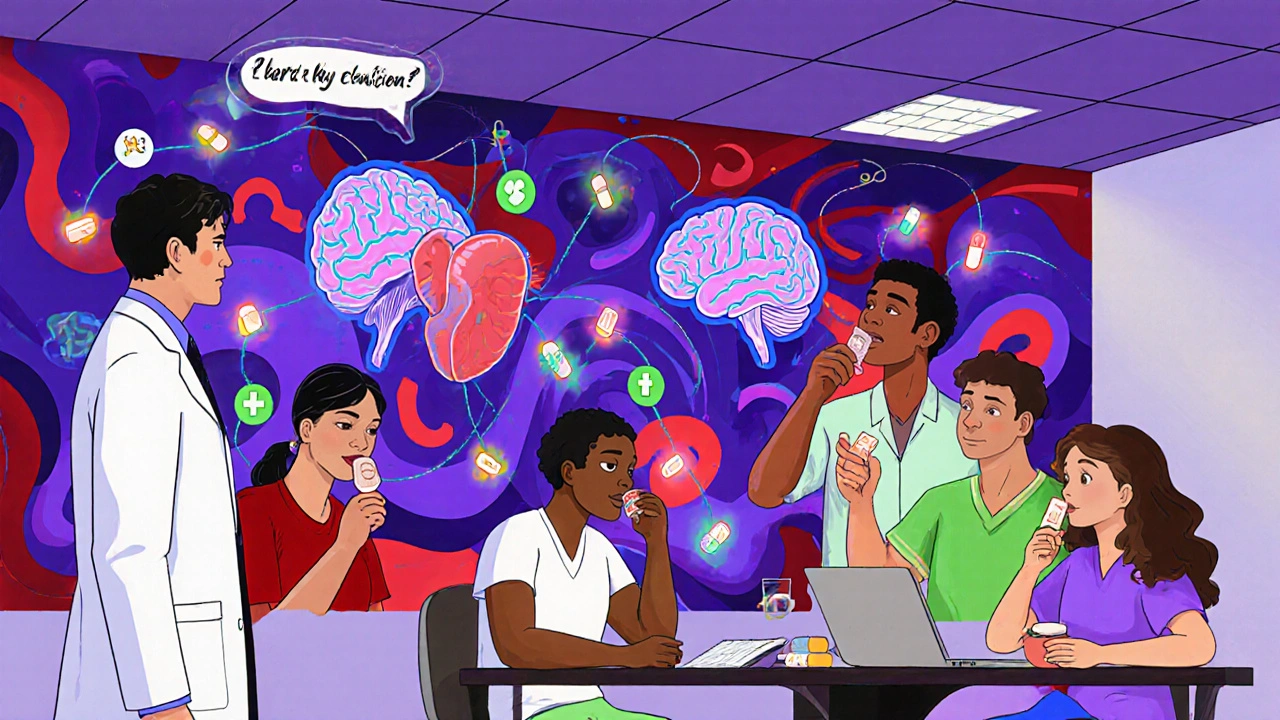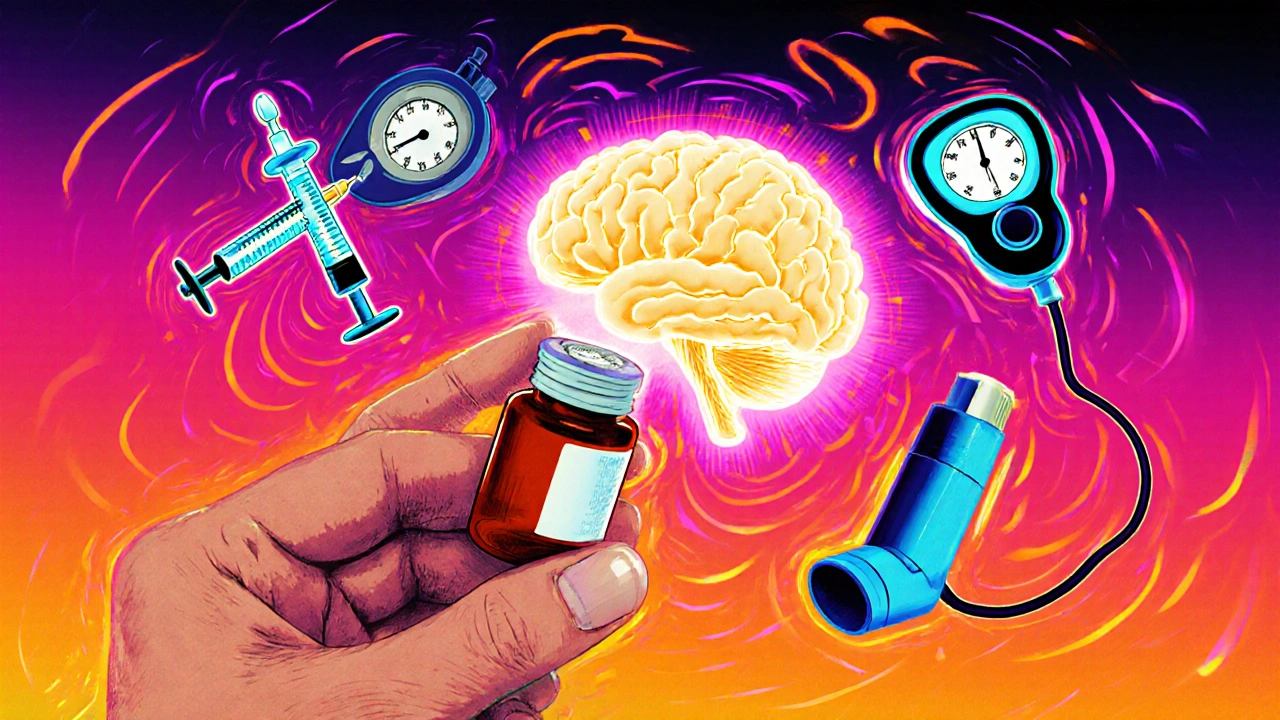When someone says they take medication for anxiety or depression, the response isn’t always understanding. Sometimes it’s silence. Sometimes it’s a raised eyebrow. Sometimes it’s a comment like, "You’re just taking pills to feel normal?" This isn’t just awkward-it’s harmful. Mental health medication stigma keeps people from getting the care they need, and it starts with how we talk about it.
Why Medication Stigma Is Different From General Mental Health Stigma
People might understand that depression is real. But when it comes to taking a pill for it, suddenly it’s seen as weakness, laziness, or even addiction. That’s medication-specific stigma. It’s not just about having a mental health condition-it’s about using medicine to treat it. Many believe psychiatric drugs are "mind-altering" in a negative way, like street drugs. But insulin doesn’t make someone weak for managing diabetes. Blood pressure pills don’t mean someone lacks willpower. Why should antidepressants be any different? The numbers show how deep this goes. Nearly one in four people prescribed antidepressants stop taking them within a month-not because the medication didn’t work, but because they felt ashamed. Over two-thirds of people hide their medication use from coworkers. And even healthcare providers aren’t immune: one in five primary care doctors admit to having negative feelings toward patients who ask for psychiatric meds. This stigma doesn’t come from nowhere. It’s fueled by language. Words like "meds," "pills," or "drugs" trigger negative associations. Studies show that switching to "medications" or "treatment" reduces stigma by over 40%. The difference isn’t subtle-it’s powerful.How Language Changes Everything
The way you phrase something matters more than you think. Saying "I’m on medication for my brain" sounds different than "I’m taking pills for my depression." One frames it as medical care. The other frames it as a personal failing. Think about how you talk about physical health. You don’t say, "I take heart pills." You say, "I take medication for high blood pressure." You don’t say, "I’m on insulin because I’m lazy." You say, "I manage my diabetes with insulin." That’s the standard. Why not treat mental health the same way? Clinics that train staff to use precise, non-stigmatizing language report a 27% drop in patient shame. Simple changes-like saying "medication" instead of "drugs," or "brain chemistry" instead of "mental breakdown"-make people feel seen, not judged. It’s not about being politically correct. It’s about being accurate and compassionate.Normalizing Medication Through Comparison
One of the most effective ways to reduce stigma is to compare mental health treatment to physical health treatment. Most people understand that diabetes needs insulin. Heart disease needs statins. High blood pressure needs daily pills. But when someone says they need medication for depression, it’s often treated like a choice-not a medical necessity. The science backs this up. For moderate to severe depression, 70-80% of patients need medication in addition to therapy to get better. That’s not a small number. That’s the majority. And the effectiveness? Around 40-60%, which is on par with many medications used for asthma, high cholesterol, or migraines. When providers use this comparison in conversations, patients are far more likely to stay on treatment. A simple line like, "This medication helps balance your brain chemistry, just like insulin helps balance your blood sugar," changes the entire tone. It moves the conversation from judgment to understanding.
Three Steps to Talk About Medication Without Shame
Talking about mental health meds doesn’t have to be a battle. Here’s a practical, proven framework used by clinics across the U.S.:- Normalize: "Many people take medication for mental health conditions-just like others take medication for heart disease or thyroid issues. It’s not unusual. It’s medical care."
- Educate: "This isn’t a mood enhancer. It’s a tool to help your brain function better. It doesn’t change your personality-it helps you feel like yourself again."
- Personalize: "For me, this medication means I can show up for my kids without crying all day. It doesn’t fix everything, but it gives me the space to do the work."
What Works When Talking to Someone Who’s Skeptical
Not everyone will be open. Some people have deep-seated beliefs. Maybe they grew up hearing that "real men don’t take pills," or that "prayer is enough." Or maybe they’ve seen someone misuse medication and now assume all psychiatric drugs are dangerous. Here’s what actually works:- Ask, don’t assume. Instead of saying, "You shouldn’t feel ashamed," try, "What are your biggest concerns about taking medication?" This opens the door instead of shutting it.
- Share stories, not statistics. A 2023 study found that hearing a real person talk about their experience with medication increased intention to take it by 22%. A YouTube creator with 2.4 million subscribers saw 68% of viewers report reduced stigma after watching his honest videos about SSRIs.
- Don’t fight myths head-on. If someone says, "Those drugs turn people into zombies," don’t argue. Say, "I’ve heard that before. What I’ve noticed is that when the dose is right, people feel more like themselves-not less. Have you seen that too?"

Why Primary Care Is the Frontline Against Stigma
For too long, mental health medication has been siloed in psychiatric clinics. That sends a message: "This isn’t real medicine. This is something special, scary, and separate." But when a patient goes to their regular doctor for a cold, and the same doctor asks, "How’s your sleep? Are you still taking your antidepressant?"-that’s normalization in action. Research shows integrating mental health meds into primary care reduces stigma by 38%. Patients don’t feel like they’re being sent to the "crazy doctor." They feel like they’re getting comprehensive care. By 2026, over two-thirds of antidepressant prescriptions will be written in primary care settings-up from just over half today. That’s not just a trend. It’s a shift in how we view mental health. And it’s one of the most powerful tools we have to break down stigma.What to Do If You’re the One Taking Medication
If you’re on medication and you feel ashamed, you’re not alone. One in five college students report hiding their pills because they’re embarrassed. But here’s what works for people who’ve moved past that:- Keep your meds in a regular pill organizer-not a fancy box with "antidepressants" written on it.
- Use phrases like, "I take medication for my brain health," not "I’m on drugs."
- Find one person you trust and tell them. Often, the fear of judgment is worse than the reality.
- Follow people online who talk openly about their meds. Reddit’s r/mentalhealth has over 1,200 upvotes on posts about normalizing medication use.
What’s Changing-And What’s Next
The tide is turning. The CDC’s "Medications as Medicine" campaign is reframing psychiatric drugs as part of chronic disease management. A new $2.4 million federal study is testing "Medication Normalization Training" in 15 community clinics. And healthcare providers who share their own experiences with medication-yes, even doctors-are seeing stigma drop by 37% among medical students. Telehealth is still a challenge. Over 40% of patients say they feel less comfortable discussing meds over video calls. But that’s a problem of design, not intent. The solution? Training providers to create safe, private, and human-centered virtual spaces. The bottom line? Stigma isn’t going away because we wish it would. It’s going away because we change the conversation. One word. One comparison. One honest story at a time.Why do people feel ashamed of taking mental health medication?
People feel ashamed because of misinformation and cultural myths-like thinking psychiatric meds are addictive, make you "not yourself," or signal weakness. These beliefs are often rooted in outdated ideas or confusion with recreational drugs. But research shows these medications are no more addictive than blood pressure pills and are just as medically necessary for many people. Shame comes from stigma, not from the medication itself.
Is it okay to tell my employer I take mental health medication?
You’re not legally required to disclose your medication use to your employer. In fact, doing so can carry risks-43% of people who disclosed reported discrimination, including being passed over for promotions. If you need accommodations under the ADA, you can request them without revealing specific meds. Focus on your ability to do the job, not your treatment plan.
Do mental health medications really work?
Yes. For moderate to severe depression, anxiety, or bipolar disorder, medications have a 40-60% effectiveness rate, similar to many treatments for physical conditions like asthma or migraines. For 70-80% of people with moderate to severe depression, medication combined with therapy is the most effective approach. They don’t "cure" the condition, but they help the brain function well enough for other treatments to work.
Can talking about my meds make stigma worse?
It can-if you use stigmatizing language like "I’m on drugs" or if you frame it as a personal failure. But when you use clear, medical language-"I take medication for my brain chemistry"-and compare it to physical health treatments, stigma decreases. The key is how you say it, not whether you say it.
What’s the best way to support someone taking mental health medication?
Listen without judgment. Ask, "How’s your treatment going?" instead of "Are you still taking those pills?" Avoid giving unsolicited advice. Don’t say, "You don’t need meds-you just need to pray harder" or "Try yoga instead." Support means respecting their choices and treating their treatment like any other medical care.
Why do some cultures have more stigma around mental health meds?
Cultural beliefs play a big role. For example, Asian American communities show 47% lower antidepressant adherence than White Americans, often due to beliefs that mental health issues should be handled privately or through family support-not medication. In some cultures, taking pills is seen as admitting failure or bringing shame to the family. These beliefs are deeply rooted but can change with education and culturally tailored messaging.
Are there tools to help me talk about my medication?
Yes. The SAMHSA "Medication Conversation Starter" app has been downloaded over 150,000 times and offers scripted responses to common stigmatizing comments. It helps people feel more confident when they’re asked, "Why do you need that?" or "Isn’t that just for crazy people?" There are also free NAMI workshops that teach communication skills-87% of participants report improved confidence after completing them.

Stephanie Deschenes
November 26, 2025 AT 14:16I’ve been on SSRIs for five years now. I used to hide my pill organizer like it was contraband. Then I switched to a plain white box and started saying, "I take medication for my brain chemistry"-same as my mom takes for her thyroid. No one bats an eye anymore. It’s not magic, but it’s medicine. And that’s okay.
People don’t shame you for insulin. Why should antidepressants be different? The language shift changed everything for me.
I’ve had coworkers ask if I’m "fixed" now. I just smile and say, "I’m managing. Like anyone with a chronic condition." It’s not a confession. It’s a fact.
And honestly? The more I normalize it, the more others feel safe to talk about their own stuff. It’s not about being loud. It’s about being steady.
One quiet conversation at a time.
That’s how stigma dies.
Not with arguments. With consistency.
Cynthia Boen
November 26, 2025 AT 15:50This whole post is just woke corporate propaganda. You’re telling people to say "medication" instead of "pills" like that’s some kind of miracle cure. Newsflash: people know what you’re talking about. You’re just trying to police language so you feel better about yourself.
And don’t get me started on comparing antidepressants to insulin. One keeps you alive. The other just makes you numb. Don’t equate them. It’s dishonest.
Also, 70-80% need meds? Where’s your citation? This reads like a pharmaceutical ad written by a PR firm.
Amanda Meyer
November 26, 2025 AT 20:06While I appreciate the intent behind this piece, I must push back on the assumption that language alone can dismantle systemic stigma. Yes, replacing "drugs" with "medication" is helpful-but it’s surface-level. The deeper issue is the medicalization of emotional suffering in a culture that equates resilience with silence.
When a primary care doctor casually asks about antidepressants during a cold visit, that’s powerful. But that’s not just language-it’s institutional normalization. And that requires policy, training, and funding-not just phrasing tweaks.
Also, the statistic about 40% reduction in stigma with word changes? That’s from the 2021 JAMA Psychiatry meta-analysis, right? I’d love to see the full study cited. Without context, even well-intentioned claims risk becoming performative.
And yes, I’ve seen patients who feel more shame after being told, "This is just like insulin." Because for them, it’s not. Mental illness carries a moral weight physical illness doesn’t. We can’t erase that with semantics alone.
But we can honor it by listening more than we lecture.
vikas kumar
November 27, 2025 AT 09:16In India, my mom thought I was weak for taking meds. She said, "We’ve always dealt with sadness through prayer and family." I didn’t argue. I just started taking my pills in the bathroom, same time as my vitamins. After six months, she asked why I was taking so many pills. I said, "For my brain. Like you take calcium for your bones." She didn’t say anything. But next week, she brought me a new pillbox.
That’s how it changes. Not with speeches. With quiet consistency.
And yes, I still don’t tell my coworkers. But I don’t hide anymore either. I just don’t make it a big deal.
That’s enough for now.
Vanessa Carpenter
November 28, 2025 AT 01:58My therapist said something once that stuck: "You don’t need to explain your insulin. Why do you need to explain your antidepressant?"
I started saying "I take medication for my brain" instead of "I’m on antidepressants."
It’s weird how much that tiny shift helped.
People still ask questions, but they don’t look at me like I’m broken anymore.
Also, I keep my pills in a travel case from the airport. No labels. No drama.
Just me, my meds, and my peace.
Bea Rose
November 29, 2025 AT 15:40"Medication" isn’t magic. It’s just a synonym for pills. People still know what you mean.
And no, comparing antidepressants to insulin is misleading. One is life-sustaining. The other is often a band-aid for societal failure.
Also, 70-80% need meds? Where’s your peer-reviewed data? This feels like a marketing pamphlet dressed as advice.
Language policing won’t fix a culture that pathologizes sadness.
Stop trying to rebrand shame as medical necessity.
Michael Collier
December 1, 2025 AT 04:19While the sentiment behind this post is commendable, the underlying assumption-that stigma can be eradicated through linguistic reframing alone-overlooks the sociocultural and economic determinants of mental health care access. The normalization of psychiatric medication in primary care settings is indeed a critical development; however, it is contingent upon systemic investment in mental health infrastructure, provider training, and insurance parity.
Furthermore, the assertion that "medication" is inherently less stigmatizing than "pills" is linguistically valid but empirically incomplete. Stigma is not merely lexical; it is structural, historical, and often racialized. For instance, Black and Latinx communities are disproportionately prescribed antipsychotics over SSRIs, reflecting diagnostic bias rather than clinical need.
Language reform must be paired with equity-driven policy. Otherwise, we risk creating the illusion of progress while leaving the architecture of harm intact.
Let us not confuse semantic elegance with substantive justice.
Shannon Amos
December 1, 2025 AT 12:34So let me get this straight… we’re supposed to say "medication for brain chemistry" instead of "pills for depression" so people won’t judge us?
Meanwhile, the same people who say "you’re just on drugs" are the ones who think therapy is for losers.
Change the words, not the mindset. Classic.
Also, I’ve seen people take SSRIs and turn into zombies. So no, not everyone feels "more like themselves."
But hey, at least now you can say it politely while you’re zoning out in front of your laptop.